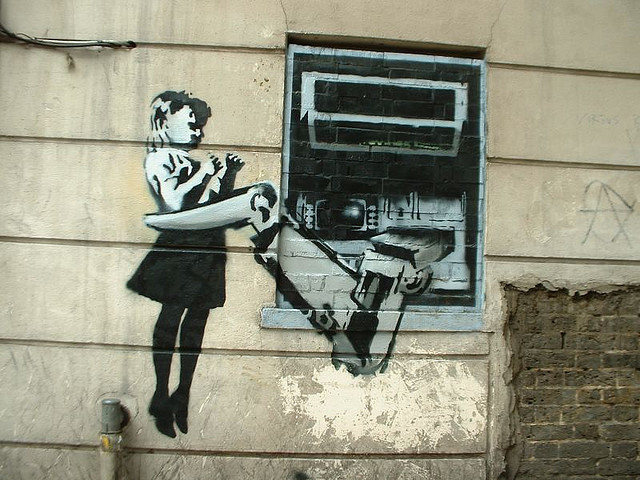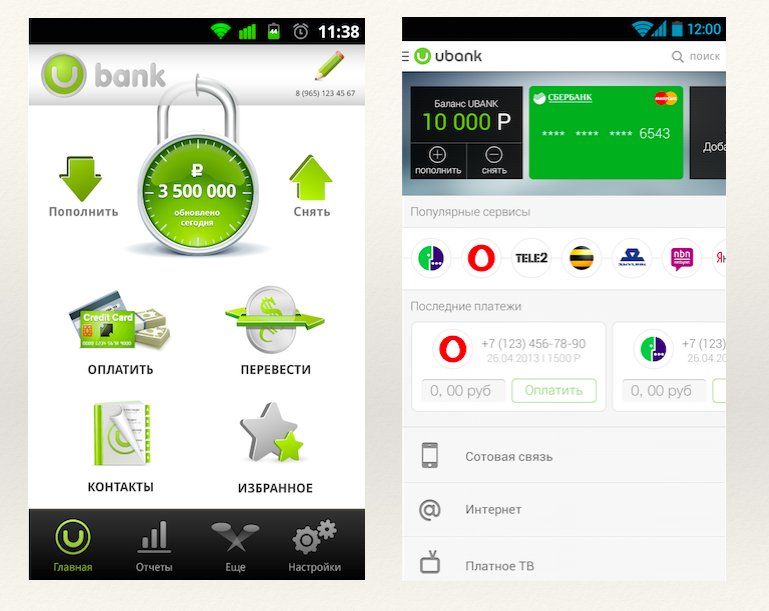Just UBANK in your pocket: how difficult it was
For our first post on Habré, the founder of UBANK, Laura Ashizheva, wrote a self-exposing text about why everything in the world is so difficult, although everyone around us, including us, strive for simplicity

Making the most revolutionary service is the same as making the most simple.
')
Today it seems obvious to everyone. Therefore, each start-up takes up the task, intending to create a piece in which everything is clear at a glance and all in one click. And almost everyone finishes the same way: he turns out so much that only the most stubborn user can wade through all the obstacles erected in his path.
Our story is a graphic illustration of this paradox.
From the first day of our mobile payment service UBANK, simplicity was at the heart of the service. After all, in order to radically simplify the lives of users, we actually started this whole project.
The current payment system in Russia is simply paradoxical. You may have already mastered all modern payment services long ago. But what does most do?
Yes, and pay for this commission, which at the station or at the airport can be up to fifteen percent.
And this is only one operation. And how many payments should be made monthly? The proliferation of banks' own mobile services does not solve the problem. After all, for traditional financial institutions, an application for a smartphone is not the most important thing in the world. And, let's say, not all of them are equally useful.
In addition, most people use the services of different banks. Salary falls on one card, in another bank there is a credit card, in the third one there is a mortgage. Remembering all your passwords and features of different financial systems is not very convenient.
We at UBANK have come up with a simple alternative to all of this - “terminal in your pocket”, a mobile application that gives the user the opportunity to pay for everything he wants, using all the cards he has, and without any fees (well or with a minimum percentage).
Therefore, our team has always believed that we are working for one cherished goal - to simplify the life of the user. And without a doubt, we, like other startups, expected to make a concise and intuitive application for people. Imagine our surprise when at some point we realized that we were actually moving in the opposite direction.

Sasquatch i
We learned from our own experience how damn difficult it is to do it simply. As soon as you move from thinking to action, you are beginning to be entangled by various problems that need to be solved somehow, and this often leads you to forget about the main goal and to make a garden. That is why there are so many complex things in the world - and so few simple ones.
For example, in the first version of UBANK, we were very worried about banking security. Financial regulation, certificates, payment systems - all this was new to us, and we even slightly complexed.
Yes, our team already had serious experience in mobile development. We made a universal mobile uTalk messenger on Java, even before WhatsApp became the king of the mountain. Our audience had twenty million users. But in the financial sector, we were worse oriented.
We were just afraid to do something wrong. Violate the law, run into troubles and fines, get blacklisted. Security guards work in the banks - mostly former military or police officers who do not care about UBANK, iPhone and Android. They will see a dozen strange payments, they will not like the percentage of fraud, and hello - they will cut you off without any hesitation.

Cash bites
Therefore, we released our first version with a very complicated authorization process so that we would not be blocked by oxygen due to the vulnerability of our system. As a result, the user had to enter a long password twice, specify an e-mail, verify it.
In addition, it was necessary to fill in a questionnaire, the data of which was used to restore access to the application. Naturally, people immediately started having problems with it. They simply did not remember what they had written in this form. In general, it was all somehow complicated.
Our interface also turned out to be complicated, which in theory was supposed to radically simplify the user's life. People did not even understand how to connect their bank card - for this it was necessary to find the menu "My Cards". Often, users did not even have a clue that they could bind a credit card to UBANK. To pay for a cell phone, it was necessary again to search for the appropriate section and perform extra actions.
The result was appropriate. Having released the application, we thought that the happy user would soon start testing the service, understand it, analyze it, compare it - and become our loyal user. Instead, many people, tapping into the app, closed it forever - and continued to walk to the terminals with bundles of cash. Our service was still too complicated.
We understood an important thing: simplicity does not tolerate compromises. It seemed to us that poking there, then here, then driving in some numbers was still easier than looking for a terminal. But for many people who first saw the smartphone, it is not.
After we realized this, we took a fresh look at the very idea of simplicity. It is often easier for people to do what they have always done - and it is much more difficult to acquire new habits. Namely, this requires any new service from them.
Therefore, if you force the user to poke twice where you can poke one, you simply chop the branch on which you are sitting - and which is not very strong either. Having understood this, we began to redo everything that was already done. Thanks to the $ 8 million deal with venture fund Runa Capital, we received the necessary resources.

The application start screen before (left) and after (right) redesign. Now you can add a bank card to your account with one touch. Previously, this required to go to the settings menu, find the desired item and click. It is not surprising that many users did not even know that a card could be tied to UBANK
Work is still a lot. But over the past year we have managed to make some changes. Now, for example, all user cards are displayed at the top of the screen - and if they are not already there, you can add a new one-click. We recently changed the logic for displaying recent payments. Now, in order to throw money back onto the phone, it’s enough to drive in the amount and click “Pay” - you don’t even have to go to another screen. We started updating the application interface last fall, and since then the number of payments has grown by more than 200%.
I wonder why it was not clear from the very beginning, you ask? Where you can cut the corner - do not hide the cards, but lay them out in the most conspicuous place - you have to do it. Is not it obvious? Oddly enough, no. Simplicity does not arise by itself. One right mood here is not enough. It takes at least the time that inevitably takes the rejection of mediocre solutions. We also need courage to break accepted stereotypes.
What did we do with superauthorization? Simplified. Now UBANK users simply enter a four-digit PIN code. What prevented it in the earlier version? Only our fear of going against the current.
To make it really easy, you have to overcome fears. Constantly question everything that is generally accepted. And, most importantly, try to achieve radical, uncompromising simplicity - and this is more difficult than it seems at first. Do not think that people are fools, just do not understand the whole brilliant brevity of your decision. True simplicity does not require any understanding.
The user is not a fool. He just, like all of us, does not like difficulties.

Making the most revolutionary service is the same as making the most simple.
')
Today it seems obvious to everyone. Therefore, each start-up takes up the task, intending to create a piece in which everything is clear at a glance and all in one click. And almost everyone finishes the same way: he turns out so much that only the most stubborn user can wade through all the obstacles erected in his path.
Our story is a graphic illustration of this paradox.
From the first day of our mobile payment service UBANK, simplicity was at the heart of the service. After all, in order to radically simplify the lives of users, we actually started this whole project.
The current payment system in Russia is simply paradoxical. You may have already mastered all modern payment services long ago. But what does most do?
To pay for the phone, many people still go to the ATM (preferably their own bank, so as not to pay a commission), remove the cache, and then shove it into the payment terminal to make a payment for a mobile phone.
Yes, and pay for this commission, which at the station or at the airport can be up to fifteen percent.
And this is only one operation. And how many payments should be made monthly? The proliferation of banks' own mobile services does not solve the problem. After all, for traditional financial institutions, an application for a smartphone is not the most important thing in the world. And, let's say, not all of them are equally useful.
In addition, most people use the services of different banks. Salary falls on one card, in another bank there is a credit card, in the third one there is a mortgage. Remembering all your passwords and features of different financial systems is not very convenient.
We at UBANK have come up with a simple alternative to all of this - “terminal in your pocket”, a mobile application that gives the user the opportunity to pay for everything he wants, using all the cards he has, and without any fees (well or with a minimum percentage).
Therefore, our team has always believed that we are working for one cherished goal - to simplify the life of the user. And without a doubt, we, like other startups, expected to make a concise and intuitive application for people. Imagine our surprise when at some point we realized that we were actually moving in the opposite direction.

Sasquatch i
A year ago, uBank forced people to puzzle over the simplest tasks for a long time and painfully strain their memory. How did that happen?
We learned from our own experience how damn difficult it is to do it simply. As soon as you move from thinking to action, you are beginning to be entangled by various problems that need to be solved somehow, and this often leads you to forget about the main goal and to make a garden. That is why there are so many complex things in the world - and so few simple ones.
For example, in the first version of UBANK, we were very worried about banking security. Financial regulation, certificates, payment systems - all this was new to us, and we even slightly complexed.
Yes, our team already had serious experience in mobile development. We made a universal mobile uTalk messenger on Java, even before WhatsApp became the king of the mountain. Our audience had twenty million users. But in the financial sector, we were worse oriented.
We were just afraid to do something wrong. Violate the law, run into troubles and fines, get blacklisted. Security guards work in the banks - mostly former military or police officers who do not care about UBANK, iPhone and Android. They will see a dozen strange payments, they will not like the percentage of fraud, and hello - they will cut you off without any hesitation.

Cash bites
Therefore, we released our first version with a very complicated authorization process so that we would not be blocked by oxygen due to the vulnerability of our system. As a result, the user had to enter a long password twice, specify an e-mail, verify it.
In addition, it was necessary to fill in a questionnaire, the data of which was used to restore access to the application. Naturally, people immediately started having problems with it. They simply did not remember what they had written in this form. In general, it was all somehow complicated.
Our interface also turned out to be complicated, which in theory was supposed to radically simplify the user's life. People did not even understand how to connect their bank card - for this it was necessary to find the menu "My Cards". Often, users did not even have a clue that they could bind a credit card to UBANK. To pay for a cell phone, it was necessary again to search for the appropriate section and perform extra actions.
The result was appropriate. Having released the application, we thought that the happy user would soon start testing the service, understand it, analyze it, compare it - and become our loyal user. Instead, many people, tapping into the app, closed it forever - and continued to walk to the terminals with bundles of cash. Our service was still too complicated.
We understood an important thing: simplicity does not tolerate compromises. It seemed to us that poking there, then here, then driving in some numbers was still easier than looking for a terminal. But for many people who first saw the smartphone, it is not.
To win the recognition of a large audience, the service should not just be simple. It should be such that nowhere is easier.
After we realized this, we took a fresh look at the very idea of simplicity. It is often easier for people to do what they have always done - and it is much more difficult to acquire new habits. Namely, this requires any new service from them.
Therefore, if you force the user to poke twice where you can poke one, you simply chop the branch on which you are sitting - and which is not very strong either. Having understood this, we began to redo everything that was already done. Thanks to the $ 8 million deal with venture fund Runa Capital, we received the necessary resources.

The application start screen before (left) and after (right) redesign. Now you can add a bank card to your account with one touch. Previously, this required to go to the settings menu, find the desired item and click. It is not surprising that many users did not even know that a card could be tied to UBANK
Work is still a lot. But over the past year we have managed to make some changes. Now, for example, all user cards are displayed at the top of the screen - and if they are not already there, you can add a new one-click. We recently changed the logic for displaying recent payments. Now, in order to throw money back onto the phone, it’s enough to drive in the amount and click “Pay” - you don’t even have to go to another screen. We started updating the application interface last fall, and since then the number of payments has grown by more than 200%.
I wonder why it was not clear from the very beginning, you ask? Where you can cut the corner - do not hide the cards, but lay them out in the most conspicuous place - you have to do it. Is not it obvious? Oddly enough, no. Simplicity does not arise by itself. One right mood here is not enough. It takes at least the time that inevitably takes the rejection of mediocre solutions. We also need courage to break accepted stereotypes.
What did we do with superauthorization? Simplified. Now UBANK users simply enter a four-digit PIN code. What prevented it in the earlier version? Only our fear of going against the current.
To make it really easy, you have to overcome fears. Constantly question everything that is generally accepted. And, most importantly, try to achieve radical, uncompromising simplicity - and this is more difficult than it seems at first. Do not think that people are fools, just do not understand the whole brilliant brevity of your decision. True simplicity does not require any understanding.
The user is not a fool. He just, like all of us, does not like difficulties.
Source: https://habr.com/ru/post/226023/
All Articles